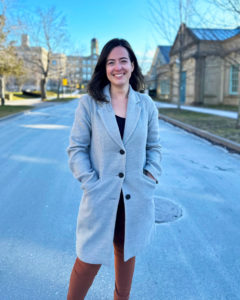 Knowing as much as they do about the interview process, it’s no surprise that journalists are often more comfortable asking questions than answering them. As Master of Journalism student Catherine Morasse laughingly says, “I’m the one who’s usually holding the microphone.” But Morasse, warm and wonderfully communicative, quickly settles, and brings both her past and future plans vividly to life.
Knowing as much as they do about the interview process, it’s no surprise that journalists are often more comfortable asking questions than answering them. As Master of Journalism student Catherine Morasse laughingly says, “I’m the one who’s usually holding the microphone.” But Morasse, warm and wonderfully communicative, quickly settles, and brings both her past and future plans vividly to life.
Recipient of the River Philip Foundation Journalism Scholarship, at the time of writing, Morasse is getting ready to move from Ottawa to Halifax to begin her studies in King’s Master of Journalism program. Born and raised in Hull, Quebec, she’s been holding that microphone and working as a journalist in a range of media positions for the past eight years. After studying media at Cégep de Jonquière, well known for its journalism program, Morasse began working at Ottawa and Gatineau weekly papers before moving over to Le Droit, Ottawa’s major French-language daily, where a three-month internship led to a position editing and writing about the arts. “Le Droit was my training ground,” she says. “I was writing in the newsroom, on the weekends covering everything and then I was assigned to cover the arts.” Concurrently, she did an Honours Bachelor of Social Sciences in Conflict Studies and Human Rights at the University of Ottawa. And there’s more: for the past two years, Morasse has worked at Radio-Canada developing her television and radio broadcast and production skills.
To this rich jigsaw of journalistic and educational experiences, Morasse layered in some significant travel. “I had really wanted to travel and I’d been planning and saving for a long time. I spent the last four months of 2019 in Greece, the Balkans and the Middle East with a friend. Then I found a really cheap flight from Tel Aviv to Rio de Janeiro in time for Carnival, which was incredible. My mother joined me in Peru and when we were high in the Andes, on our way to Machu Picchu, the world changed. I will never forget a man arriving on horseback to tell us about the pandemic and that Peru was going into lockdown. There were no flights, no public transportation, it was total lockdown and we were in the mountains. Luckily, we were able to leave the country after two weeks.”
Though fluently bilingual, Morasse feels she will benefit from doing her MJ in English. “In French, my writing has flavour…a personal style. But in English I have room to develop,” she explains. King’s program intrigued her for its reputation in the development of research and data mining skills. “I am already comfortable doing daily reporting. I want to change the pace and develop stories that require more research and do investigative pieces,” she says. Drawn to a wide range of topics, Morasse has a particular interest in women’s issues including sexual violence and the way women are treated by the justice system. “And I love environmental issues,” she adds. “I love stories that have a human impact.” Morasse is also a believer in paying it forward; she’s been instrumental in the development of the Bourse Marthe-Blouin, an award for student journalists from the Fédération professionnelle des journalistes du Québec in the Outaouais region.
“I come from a place of curiosity,” Morasse says, reflecting on what she has to offer as a journalist. “These last two years at Radio-Canada I’ve been learning broadcasting in both TV and radio and now I’m curious to learn new ways to do this job, particularly the use of data. And I try to be as rigorous and ethical as possible in my coverage.” Morasse didn’t really anticipate receiving the Bragg Scholarship. “I was thrilled,” she exclaims. “When you’ve been on your own financially, working and studying…well, it will make a huge difference!”

